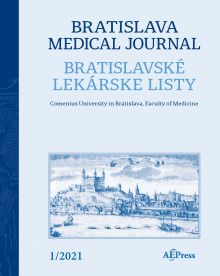Journal info
|
||||
Select Journal
Journals
Bratislava Medical Journal 2024 Ahead of print 2023 2022 2021 2020 2019 2018 2017 2016 2015 2014 2013 2012 Endocrine Regulations General Physiology and Biophysics Neoplasma Acta Virologica Studia Psychologica Cardiology Letters Psychológia a patopsych. dieťaťa Kovove Materialy-Metallic Materials Slovenská hudbaWebshop Cart
Your Cart is currently empty.
Info: Your browser does not accept cookies. To put products into your cart and purchase them you need to enable cookies.
Bratislava Medical Journal Vol.118, No.7, p.386-390, 2017 |
||
| Title: Dose-dependent effects of adiponectin on ADAMTS-9 gene expression in human chondrocytes | ||
| Author: K. O. Yaykasli, O. F. Hatipoglu, E. Yaykasli, E. Kaya, M. Ozsahin, M. Uslu | ||
| Abstract: OBJECTIVE: A disintegrin and metalloproteinase with thrombospondin motifs (ADAMTS), comprising of 19 members is a family of peptidases. They have several vital functions in physiological and pathological processes in organisms. ADAMTS-9 has aggrecanolytic activity and is responsible for degradation of aggrecan mainly in articular cartilage. It is known that adiponectin is the most abundantly secreted adipokine (adipocytokines), and the characteristics of adiponectin have not been elucidated yet. It was assumed that adiponectin has anti-inflammatory effect before. However, an inflammatory feature of adiponectin was shown in researches. In our study, the effect of adiponectin on ADAMTS-9 gene expression in primary human chondrocytes was investigated. METHODS: Primary human chondrocytes were exposed to adiponectin at 1, 4, 8 and 12 µg/ml doses for certain time period. Total RNA was isolated and reverse-transcribed by random primer after incubation. ADAMTS-9 and β-actin genes expression levels were determined using real-time polymerase chain reaction (qRT-PCR). RESULTS: The highest upregulation of ADAMTS-9 gene expression level was found at 12 µg/ml dose of adiponectin and 48 h incubation. CONCLUSION: Adiponectin is the key element in the maintenance of cartilage homeostasis. Similarly, the involvement of adiponectin in articular inflammatory diseases was demonstrated in detail. These findings bring adiponectin into central place in the research to develop adiponectin based new therapy methods for arthritic diseases. Together with these findings, our results suggest that adiponectin may be involved in the degradation of articular cartilage by increasing ADAMTS-9 gene expression (Tab. 1, Fig. 3, Ref. 35). |
||
| Keywords: adiponectin, ADAMTS-9, human chondrocytes | ||
| Published online: 24-Jul-2017 | ||
| Year: 2017, Volume: 118, Issue: 7 | Page From: 386, Page To: 390 | |
| doi:10.4149/BLL_2017_075 |
||
|
|
 download file download file |
|

